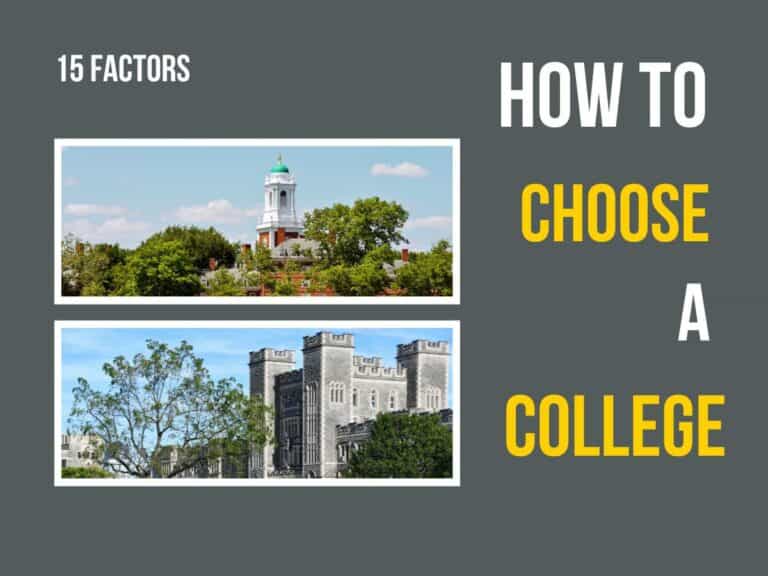How to Convince Your Teenager to Go to College: Parent’s Guide
Around 75% of high school teenage kids are moderately, slightly, or totally unready to make any college or career decisions after graduation, says K-12 Dive.
If your child shows very little to no interest in heading to college, don’t panic.
You can encourage your teener to go to college after high school by discussing the perks of having a college degree, exploring different majors, explaining how college can be affordable, and taking campus tours.
It’s also a great idea to talk about alternatives to college if it seems like your child needs more time to think.
Pointing your adolescent in the right direction is fine.
Pushing him or her to go in that direction is a complete no-no!
The steps on how to convince someone to go to college is a form of art, and it’s crucial to adjust the approach to go with the high schooler’s frame of mind, interests, and goals in life.

10 Tips to Get Your Child Excited for College
There are many ways to try to have your teener consider a college education.
However, only a select few can work wonders.
Below are some of the steps you may take to encourage your child to send applications to several colleges and attend one after getting his or her hands on a high school diploma.
Point Out the Perks of Having a College Degree
College degree holders enjoy a lot of perks that non-college degree holders don’t.
According to the Association of Public & Land-Grant University (APLU), compared to people whose highest educational attainment is a high school diploma, college graduates tend to:
- Generate 84% more money
- Make $1.2 million more on average over their lifetime
- Be 50% less likely to be employed
Meanwhile, CNBC reports that college grads are generally happier individuals.
It explains that 94% of those with a bachelor’s degree or higher report feeling happy or very happy with their lives, while only around 89% of high school graduates with no college say the same.
Talk About Success Stories
Summing up various survey results, Entrepreneur says nine out of 10 millionaires have college degrees.
It’s true that many successful individuals have no college degrees.
However, it’s worth pointing out that they are the few exceptions and not the rule — highly successful individuals without any college education make up the minority, roughly 6%.
Share Personal College Experiences
Did you go to college yourself and have the time of your life, too?
Allow your teenager to know how pivotal the role college played in your professional success, social development, personal growth, and overall happiness and satisfaction with your existence.
You may even look for ways how to convince someone to enroll in your school to enjoy the same perks, which, in instances where legacy preference is in place, may help increase your child’s chances of getting in.
Identify Your Teen’s Interests and Talents
Sit down with your child and talk about the things he or she loves and are good with.
Point out how it’s possible to cultivate them further with the help of academic programs and extracurricular activities exclusive to certain colleges and universities.
Does your child love to travel?
The two of you may search for a college with an awesome study and internship program abroad, particularly the kind that will enable your teen to fly to a country with a fascinating history and culture.
Navigate Various Career Paths
Whether your high school student thinks about designing video games or providing direct care to sick people, there’s a right and recommended path to go about achieving a particular career goal.
In many instances, attending college helps pave the way.
After establishing a role in a particular industry, it’s easier to map one’s career path by:
- Determining the right educational choice
- Establishing the essential soft skills to master
- Identifying where and how to gain the necessary experience
- Setting a realistic and attainable timeline
Discuss Lowering the Cost of College
College affordability is a major concern for many, says the National Center for Education Statistics (NCES).
As a matter of fact, it reveals that less than 40% of those who believe their parents cannot afford to send them to college after high school enroll to pursue an undergraduate degree.
Ensure that your child knows there are ways to make college affordable.
Besides attending an in-state college or university that charges residents with lower tuition, applying for financial aid such as scholarships, grants, and loans can result in a net price much lower than the sticker price.
Don’t forget to talk about the money-saving perks of taking AP courses to earn college credit.

Provide Answers to College-Related Questions
Let your youngster know that it’s perfectly fine to ask questions about going to college.
Talking openly about pursuing an undergraduate degree helps your high schooler make better decisions.
Of course, you may not be able to provide the right answer to each and every question.
Here’s a wonderful idea: together with your child, look for the best answers on the internet!
Search for the Right Colleges
Speaking of the internet, you and your teen can utilize it to look for institutions of higher education that can best serve the specific needs and preferences of your soon-to-be high school graduate.
Consider checking out highly ranked colleges and the academic programs they’re known for.
The College Board has a college search tool that allows filtering options by:
- Majors
- Degrees
- Type
- Location
- Campus life
- Affordability
By identifying what your adolescent finds important in the pursuit of a college degree, the said tool can help facilitate the hunt for the right institution of higher education to attend.
Take a Campus Tour
After coming across colleges and universities your child shows some interest in attending, it’s time to ascertain that it’s one of those campuses where he or she should belong after high school.
It’s when the importance of visiting various institutions comes in.
Stepping foot inside a college campus allows your teen to:
- Have a sense of what it’s like to be an undergraduate there
- Sit in on a class related to one’s intended major
- Talk with admissions officers, professors, and students
- Check out the facilities, including housing options
- Explore the campus’ neighboring areas
In most instances, college tours themselves are free of charge.
Flying to where campuses are isn’t!
The cost of visiting a college can range anywhere from $500 to $2,000 or higher — limit the institutions to visit to those at the top of your high schooler’s college list.
Or you may also consider taking virtual campus tours.
Arrange a Meeting With the High School Counselor
In some instances, the best way how to convince someone to go to school instead of joining the workforce is by having a consultation with one’s high school counselor.
A school counselor can help with many things, from family issues to social concerns.
He or she can also provide support and guidance as high school teens make arguably one of the most important decisions of their lives: whether or not to go to college after high school graduation.

Not Ready for College? Consider Various Alternatives
In some instances, graduating high schoolers may entertain the idea of attending college.
However, they may not be ready to make up their minds yet.
Refrain from forcing your teener to pursue postsecondary education after graduating, stressing that it’s the only step that makes sense after completing high school.
Otherwise, after a few weeks, you could find yourself looking for tips on how to convince someone not to drop out of college or how to convince someone to study to avoid flunking out of college.
If it seems like your adolescent isn’t ready to work on an undergraduate degree, consider alternatives.
Taking a Gap Year
According to the Gap Year Association (GYA), there’s no data on how many students take a gap year each year, but it confirms that interest in having one continues to grow each time.
It adds that 90% of those who take a gap year return to college within a year.
Inform your teen that taking a gap year is always an option.
However, establish, too, that it’s vital to spend it wisely — the goal is to determine one’s true interests and calling in life to make better college-related decisions.
Some of the best ways to spend a gap year include:
- Getting a job
- Doing an internship
- Volunteering
- Traveling
- Learning a foreign language
- Running a small business
Enrolling in Online Courses
Attending college online is the perfect option for adult learners.
However, if your teen is not ready to commit to a full online bachelor’s degree, suggest taking a few online courses, particularly those that have something to do with his or her interests and passion.
Career Karma says that the online coding bootcamp market saw an increase of over 4% in 2019.
It also estimated that nearly 43,000 individuals attended and graduated from these bootcamps.
Check if your high school teenager finds online learning an option if going to college in the traditional manner doesn’t sound right or convincing at the moment.
Attending a Trade School or Community College
Does your child want to join the workforce in no time?
Together, identify career options and look for an appropriate program available at a vocational or trade school to prepare for it and increase his or her marketability in the job market.
Feel free to recommend going to a community college.
In two years, your child can earn an associate degree necessary for more career opportunities and higher earning potential.
Disclaimer: The views and opinions expressed in this article are those of the authors and do not necessarily represent those of the College Reality Check.





